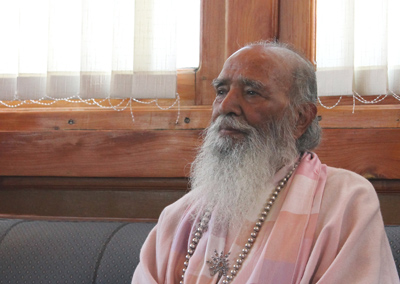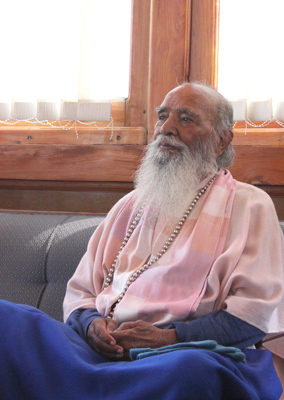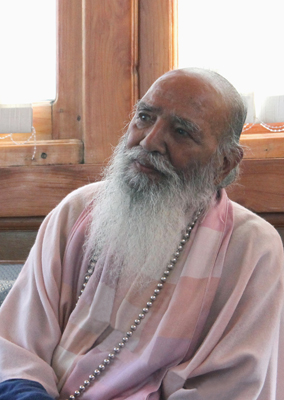Practice Means Knowledge—
Which You Already Are

… Eternal Presence in Sanskrit is Shashwat Sanatan. People do not know what this means. A listener can only listen to someone regarding what he himself knows. Suppose the spacecraft reached Mars. All of you have seen and known this, and I have seen and known it, so we can talk about it. But we do not know how the spacecraft had been prepared, because we have not seen it. Only the scientists who prepared it know how to speak about it. Thus, the one who began making you, he must know about it. You cannot know how you have been made—and by whom. A mother can know that her child is made out of her, but the child can never know that his mother is made out of him. So Eternal Presence cannot be known by a human ego-intellect-mind. Even if you call it his imagination, he cannot imagine Eternal Presence, he cannot work on what it is. …
You cannot know that which you have not seen. How can anybody approach you, who are totally nil in knowing that which has not been seen? If somebody says, “You are That,” it is not correct for him to say this, unless you, as a person, become deserving. Deserving means that if you are hungry, you can be given food. If you are not hungry, you will refuse anything given to you. All human beings are settled in that they are human beings. They have senses and a mind—not that they knew this, rather somebody told them. How is it that a young child can know Norwegian without learning it from a book? His mother keeps speaking, and soon he speaks Norwegian. You say it is too difficult a language, but for a child, there is nothing that is too difficult. …
You can understand what I have said. But you do not understand what you are doing with closed eyes in meditation. And it must be quite near you—the nearest. They are your eyes that are closed, so whatever space is there, or whatever darkness is there, it is in you. How can I explain it? When I close my eyes, nobody knows what I see in my eyes. In the same way, I do not know what you see, so I never question you about it. I only know that when your eyes are open, you will be able to do the work of the eyes—yet you will not know who is making the eyes work. We are taught, “I am doing it.” At the most you can understand, “It is I—I who open the eyes, I who close the eyes. So the I has not to see anything, because the eyes are closed.” This is the enigma. …
Questioner: I was quite astounded that day, when I closed my eyes and realized what you had just said, that the space I had been meditating on with closed eyes was changing because there was a sense of light or movement, or some subtle duality there.
Swamiji: I said this because I was also sitting there. Before the space had been bluish, and when the sun came [up over the mountain], it became yellowish. I watched that blue changes into yellow. When the sun is not there, yellow is no more a change, the space remains just the same. So here is the point. But you are not explaining it.
Questioner: You have said, “As soon as we close our eyes, that is the Self.”
Swamiji: That is the Self—which is unchanging. But when the sun came, it changed. So you, who are born unchanging, when your name was given and words were pounded into it, or invaded in it, it changed. Then why do you call that unchanging, when the Unchanging remains just the same? Even when you do not use words, when you do not hear words, when you do not see things, you are unchanging. Then why do you say, “I am changing”?
Questioner: Right. That is the point. Shashwat Sanatan, Eternal Presence. Thank you, Swamiji. [She salutes Guru, with folded hands.]
Swamiji: In Sanskrit, they started calling this [saluting with folded hands] Naman. Naman is a word, not a salutation. Naman means that the mind is not: na means not, man means mind. When we meet, we say, “Hello.” There is no mind. You respond, “Hello.” What is hello? What is “Hey! Come!”? How do you know who “hey” is? Everybody hears this, but after hearing it, you do not use your faculty, which has been given to you, of knowing. You know things, shirts, buttons, the body, the mirror, the reflection in the mirror, you know thoughts. So you remain just the same baby. … You have to let me know, what has happened to you in forty-five years? If you are the same, then what has been the effect of meditation? If you say you are the same person, “I am the same girl, with the same pants, dress, necklace and earrings” and all that, then how did you change? A man does not change and a woman does not change. Yet change is continuous. Suppose change changes into the Unchanging. That, you do not know. Why? Our system is of change. Many people say it is in time and space. We do not know whether we are in time or in space, yet everyone says this. You must be saying, “In time and space, I am a ring. And when I close my eyes, I am gold.”…
 Since we cannot live this, we practise. We practice finding out time to do so, because we cannot practise when all the talk is going on. Thus, when we meditate, that is practice. Practice is not using a saw and cutting wood—again and again, again and again. Practice means Knowledge. In English, abhyas is translated as practice. But practice is Gyan (Knowledge), Vichar (Knowledge), Atma (Self), Paramatma (Supreme Self), Brahm (Oneness)—which you already are. Yet you are seeking it somewhere! …
Since we cannot live this, we practise. We practice finding out time to do so, because we cannot practise when all the talk is going on. Thus, when we meditate, that is practice. Practice is not using a saw and cutting wood—again and again, again and again. Practice means Knowledge. In English, abhyas is translated as practice. But practice is Gyan (Knowledge), Vichar (Knowledge), Atma (Self), Paramatma (Supreme Self), Brahm (Oneness)—which you already are. Yet you are seeking it somewhere! …
You have seen a bird. It comes out, after a few days, as a bird. Before the bird is the egg. Can you ever think that the bird will know the egg it came from? I am giving you the nature of your mind, which you never thought of. Is any egg able to know the hen? Does the hen know how the egg comes or who makes it? Does the hen make the egg? …That is the state of affairs with a human system. So if you do not know that the human system was never there, how would you know that you are unborn? You only know born. So I can only talk that you are born and I am born.
Thus, it becomes personal, individual. Anyone who has practised abhyas, or knowledge, after listening to Ayam Atma Brahm (Self is Oneness), Tat Twam Asi (You are That), Sarvam Khalvidam Brahm (All this is Oneness) can know it. These are only three statements, they are not a big literature. …The beauty is that all of you have understood what I have said. That is why I am pleased. You have the best incarnation. Everything is intact. And you have potential and power, which is unseen in you. Here you can see your eyes, forehead, neck and body. But you cannot see the Knower. Since it has no name, our teachers have called it Atma, Paramatma, Brahm, Aham (I). … I leave you by saying abstract things: Ayam Atma Brahm. Tat Twam Asi. Sarvam Khalvidam Brahm. Namaste! [Applause].
.......
There is a word that is spoken which we all know: love. If I say, “You are love,” by now you have completely become a human body, which changes. So you interpret the words “You are love” as meaning you, the body. You think, “He is speaking the word ‘love,’ so he is the body.” Everybody knows that love comes from a human mother or her child, from a human being or a pet. When you see birds and animals, you see that they also love. So it has been settled, by your own intellect, that love comes from a sentient being. Love does not come from a plant, although it may have a good flower. That is what a human being’s definition of love is. When love is abstract, why should a human being know it? That which is possession, or holding, you say is rag, or attachment. A human being knows rag very well. Rag of what? Of his own body. Without his body, he cannot have potato chips—and he loves potato chips. But the potato never knows that “This person is in love with me.” [Laughter].
I have left you to make efforts to unfold the knowledge of the word “love.” If you use your knowledge, which is the ego-intellect-mind and senses, then it is possible that you will realize your Self. I can bring your attention towards that which you love the most. What do you love the most? No death. Its corollary is that you love life the most. This is observed daily. But those who see you as a kind of tree, with branches, leaves and flowers, they pluck or cut it. There are certain persons like that. They have made every human being into an inanimate tree, plant or machine, to be used for this or that. Therefore, for no fault of your own, you have missed the meaning of love. Onto that you have put the totally opposite meaning: a person who is loving or a beloved. Two machines will never love each other. But by love we think of human beings with nervous systems, which are such that the nerves manifest or emanate, but we do not know how.
Unless you develop, progress or improve your vision, or knowledge, you remain the same. A human being has the potential and power to know what a dream is. In the dream, who loves whom? In the dream, who does not love a dead body and why? In the dream, both these things are happening. But when the dream is over, the dreamer is over, the dream mechanism is over and the nerves do not produce the dream, then you wake up. Yet you never consider it.
 A human being’s nerves produce deep sleep in the evening and the waking state in the morning, and, while in deep sleep, the ignorance of the dream. Yet the dream is projected as real and as good a something as the waking state. When you wake up, you equate the dream with the waking state, saying “In the waking state I have seen those things, so they became that in the dream.” Daily we see dreams, but we do not tell each other about them. Why? You have heard me saying that dreams are nothing. So you keep to that, thinking, “Yes, I know they are everything, but if I say this to someone, he will immediately catch hold of me and say, ‘Swamiji says that dreams are nothing, so why are you telling me this?’” Daily you see everything in the waking state and you are telling each other about it, yet nobody says, “Swamiji said that the world of the waking state does not exist.” I tell you this daily. But only that you will not tell anybody. [He laughs.]
A human being’s nerves produce deep sleep in the evening and the waking state in the morning, and, while in deep sleep, the ignorance of the dream. Yet the dream is projected as real and as good a something as the waking state. When you wake up, you equate the dream with the waking state, saying “In the waking state I have seen those things, so they became that in the dream.” Daily we see dreams, but we do not tell each other about them. Why? You have heard me saying that dreams are nothing. So you keep to that, thinking, “Yes, I know they are everything, but if I say this to someone, he will immediately catch hold of me and say, ‘Swamiji says that dreams are nothing, so why are you telling me this?’” Daily you see everything in the waking state and you are telling each other about it, yet nobody says, “Swamiji said that the world of the waking state does not exist.” I tell you this daily. But only that you will not tell anybody. [He laughs.]
The words “love” and “hate” are mental. “Love and hate” does not exist. The words “Brahm,” “knowledge” and “ignorance” are mental. All three do not exist. But I cannot convince you of this. When you became a doctor and a PhD, I cannot say, “Brahm does not exist. Why do you repeat it again and again?” You want to know Brahm. And the scriptures, not the teachers, have told you, “Read the scriptures. They say Brahm alone is.” A child has heard that Brahm alone is, so he can give a speech about it: “Brahm alone is. Self alone is. You alone are. I alone am. Life alone is—and death has nothing to do with it.” But here we are speaking of that Love which is not known to any human being. And that exists.
That is the beginning, which means prarambh. Prarambh means it does not exist—it has not begun. Rather, all that prarambh is in it. It is like a man who sees a dream: the dream is in him. So prarambh is he. Yet he does not know prarambh. When he, as a child, was made, who was his prarambh, who was his original Self? Originalcould nearly be the translation of prarambh. What is original? People think original is that which nobody has conceived of. …
A human being wants to know. That is the best inquiry in him. He is deserving. He wants to know. You want to know, What is this which is death? What is this which is life—life that dies? Swamiji says life never dies. You answer that in your country nobody will understand this. In this way, you can know that you are beyond your understanding. Close your eyes. You have not to apply your understanding to this. It is. It is forever with you. These are my words. You can give it any word: Atma, Self, Paramatma, God, Brahm, Awareness, Pure Free Forever, Anand, a person, not a person, a creature, a dream, a dream figure or sky. You can do anything, but it will not work. Because this is, by itself. This Space—I am using the word now just to communicate, because you know Space—has no mother. It is forever.
Watch how nearest, closest, subtler than the subtlest it is. I say you have realized it, because you have closed the eyes and you have realized. It is not that something came and you realized it. It is not like that. It is a wrong way of approach in words. So I come and say, “Look, you have come to share this, which has never happened at your place.” Because nobody has said, en masse, for people to close their eyes. Everyone is That. As human beings, we can include this and that in it, so we say sarvam (all). Then, we include the whole world, khal. All this world is sarvam khalvidam. You can include Brahm. But it cannot be given any name. I will be quiet. … [Meditation]
Swamiji says to the audience, who are meditating: There are no words in any human being, no sound. But because sound appears, you then think, “I am the same human being,” and you forget this [known in meditation]. So we continue with the functioning of our senses the way you have been established in them. It is all perfect. If you are unhappy, well and good. If you are happy, well and good. If you are in between, well and good. This is nothing but well and good. To this you can use the word “Self.” Why? It exists in the dictionary. But when Self becomes “I am the body,” then you should not mind. And when it changes from “I am the body” to this, you should be happy. This Space is known as Anand (Indivisible). But people began to say Brahmanand, as if Anand has become Brahm, or any name. Since a human being has been only given that much power that he can know form and name, for his whole life he should continue in the field of name and form, calling it universal and individual. But here, when you hear me, you hear Me. It is only one Me. When I say “Each person,” I speak a wrong language. When the ocean is, we do not say, “Me is one wave, Me is another bubble, Me is another whirlpool.” It is all ocean water.
Open your eyes. And see, they never fail in seeing forms. Sing a song. … [They sing Amaram Hum Madhuram Hum Bhool Na Jana, or “Do not forget I am immortal, I am blissful.”] You have the power to know, to imagine that Amaram Hum Madhuram Hum is one body. On top of it, all the heads are there.[Laughter] And all the legs are there. And he walks together. Is it not one? It is! Thank you.Copyright © 1999-2014 International
Meditation Institute. All Rights Reserved